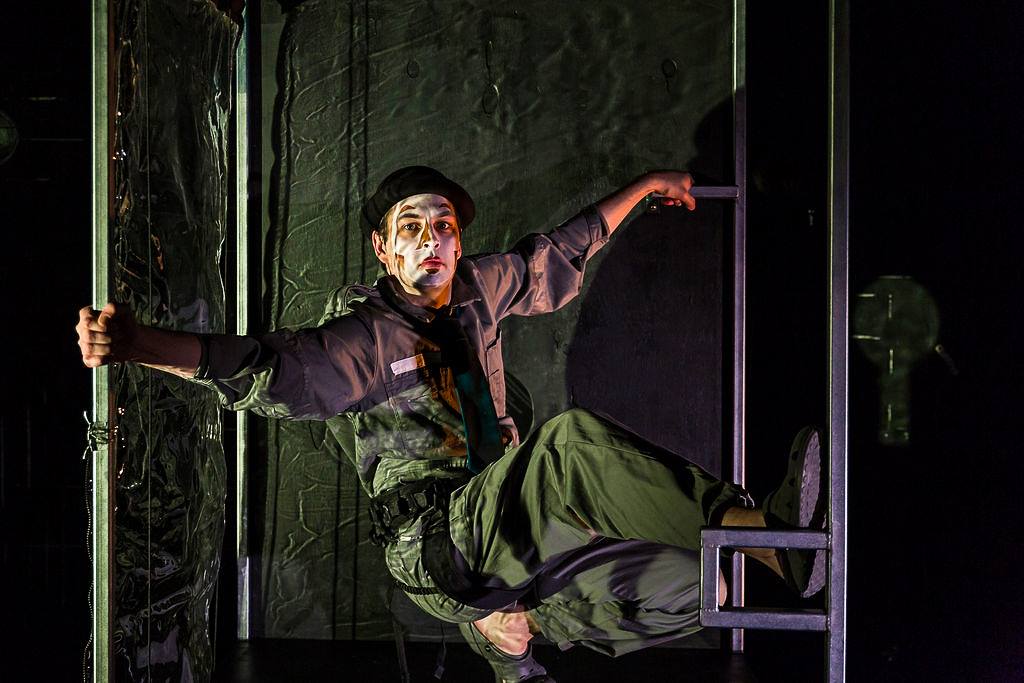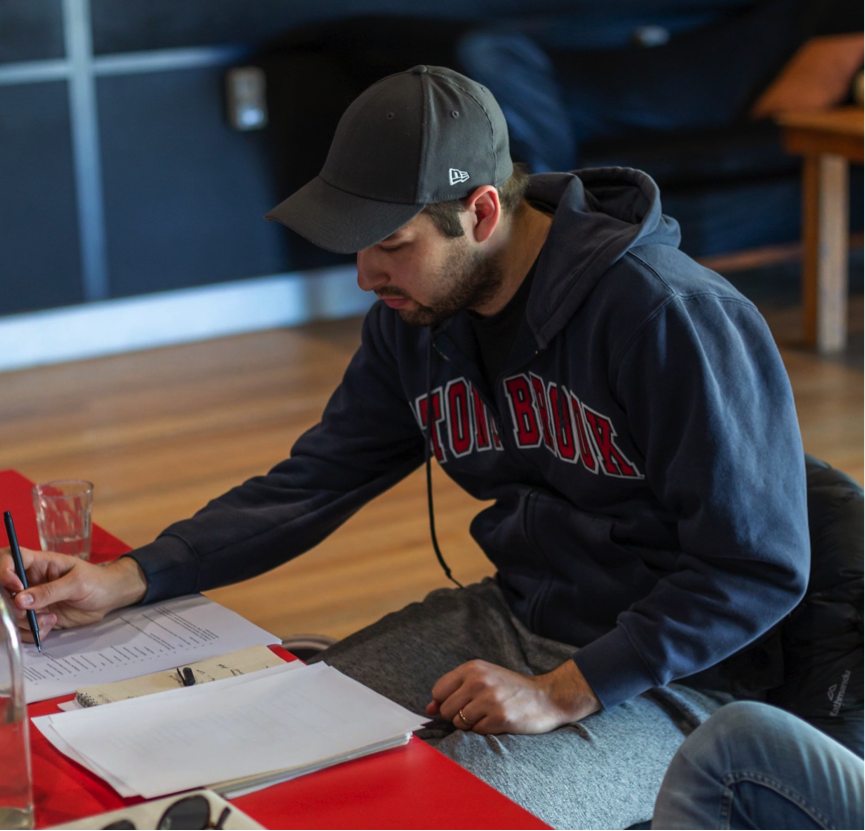
Interview with student and playwright, Dylan Van Den Berg
The team at Creative New England is creating a range of exciting competitions for one and all to get involved in over our lockdown period. But we also want to use this space to talk about some of the incredibly talented people in our community.
We’ve been really lucky to chat with Dylan Van Den Berg, a Palawa writer/performer with family connections to the Bass Strait Islands and the northeast of Tasmania, and a student at UNE studying A Master of Applied Theatre Studies. He is an incredibly a skilled playwright and has recently been shortlisted for Australia’s most prestigious playwriting prize, the Patrick White Playwrights Award by the Sydney Theatre Company.
Dylan, thank you so much for your time, we’re really excited to learn more about you!
We love your work, how did you get into Theatre?
I grew up in Tasmania and started performing when I was quite young. I’d always enjoyed writing and acting and making up stories with my brother and sister, so I’m not sure there’s a defining moment for me where I realised ‘this is it!’ It was always there and it was always encouraged. In terms of writing for the theatre, however, I distinctly remember going along to see Joanna Murray Smith’s excellent play Bombshells when I was about 15 years old. I fell in love with it and decided I wanted to write something as funny and sad and engaging one day. It took me a lot longer to finally get around to writing, though – I studied drama at the ANU and improvisation over in New York at Upright Citizen’s Brigade, performing and touring professionally before I finally wrote my first play in 2017.
What does it mean to you being able to combine your heritage with your art?
Aboriginal and Torres Strait Islander peoples have been telling stories and performing for thousands of years, so it feels like a natural thing for me to do. Combining this long history with my work as a playwright is a real privilege, and I’m excited by the possibilities of this hybrid form.
I like to weave Palawa Kani (my language) through my work, as well as dance, music, and Palawa mythology. Sadly, the devastating impact of colonisation meant that Palawa people in Tasmania lost their Dreaming. I see my work as an effort to try to find it again.
We love this!
You’ve recently been shortlisted for Australia’s most prestigious playwriting prize, The Patrick White Playwrights Award, which is run every year by Sydney Theatre Company
Well done, what an achievement!
Can you tell us a little bit about what this means to you and how much work has gone into getting here?
😀It’s a real treat! I’ve followed the Patrick White Playwrights Award for a while now, and many of the writers who’ve inspired me over the years have been acknowledged on the shortlist.
It feels a little surreal to be included, but I’m thrilled to be in such excellent company
Putting your work out there can feel like a vulnerable thing to do, but it’s so important as you never know who might read it, or the kind of feedback that might come your way. I’ve spent a number of years working on my writing, seeing as much theatre as possible, and trying to tell stories that I feel might resonate with audiences. Writing the play took a year (although, I’d say it’s not finished yet! -There’s always something more to do or refine!), and I was fortunate enough to have the support of UNE lecturers in developing the idea.
Why have you chosen to write for the stage?
It’s just always made the most sense to me. Perhaps something about the collaborative nature of theatre – I love handing my work over to a creative team and seeing what they come up with. There’s also something about watching a sustained performance -happening in real-time, and the endless possibilities of that. A play has the potential to convey something a little bit different every night and in every subsequent production. It’s not locked away in time, in the same way, a film might be.
Who are your favourite playwrights?
There are two American playwrights I really admire: Paula Vogel and Sarah Ruhl.I love how they experiment with form and combine humour with some fairly devastating themes.
Closer to home, I’m a huge fan of Aboriginal writers Wesley Enoch and Jane Harrison. Their works have never shied away from telling the disturbing truth of this nation, and I try to embed that into my own writing.
What’s the best advice you’ve received that has improved your playwriting?
There are two pieces of advice I always keep in the back of my mind;
firstly – from Dr Richard Jordan here at UNE – you can’t ‘think’ yourself out of an issue in your writing, you simply have to do it. I used to think that the answer would just come to me while I procrasta-cleaned my study for the seventh time, but it never will and the way forward is to write and write and write without judgement regarding what tumbles out. You’ll get there eventually!
And the second piece of advice is from Sarah Ruhl’s collection of essays on playwriting (among other things). Ruhl says that sometimes the most unnecessary thing in your script is the most necessary. I think we leave clues in our own work (for ourselves and others) without even realising it. Before you scribble something out, make sure you’re not erasing the heart of the work. Keep writing and reading and refining and know that even though things might not work perfectly at the start, its soul is lurking just behind the words.
How has UNE helped you on your creative path?
I’ve had the chance to refine my writing over the last two years at UNE, as well as learning how to incorporate research into my work. I used to consider research and creative writing as separate, mutually exclusive things. But I’ve really come to appreciate them as (for me, anyway!) fairly permeable elements of the creative process. As in academic discourse, I think it’s critical to know what you’re adding to the conversation; where your work sits in relation to the tapestry of stories that are already out there.

Do you have any hobbies or activities that influence you creatively?
I read a lot of plays, which regularly inspires (and intimidates!) me. I’m also a keen cook, and you’ll often find me in the kitchen listening to a musical theatre soundtrack, trying to perfect my croque-en-bouche. Cooking is just like playwriting; it requires restraint and patience, and you can never add too much garlic.
What inspires you to write?
I like to write about unusual, unexpected things as a reflection of what’s happening in the real world.
Often I’m writing about Indigenous peoples or my own family history, but sometimes I might be writing about a boy whose best friend is a fish or a woman who lives out her fantasy of being a famous writer in a shed somewhere. My favourite kinds of stories are those that surprise me, and I try to give my plays the same treatment. We don’t need any more plays set at dinner parties. Please.
And finally, what’s your favourite thing about being a part of the UNE community?
I love the diversity of the UNE community, and particularly in Theatre & Performance, how supportive staff and fellow students are. It’s lovely to be a part of.
Dylan, wow, we’ve loved learning about your creative process, thank you for sharing some of your journeys – we’re really excited to watch your work grow from here!
If you’re looking for something to keep you inspired why not check out Creative New England or join their Facebook group to keep in the loop with up and coming competitions!
There’s something for everyone! #CreativeNewEngland


